The One Thing in Your Home You’re Not Cleaning That’s Making You Sick
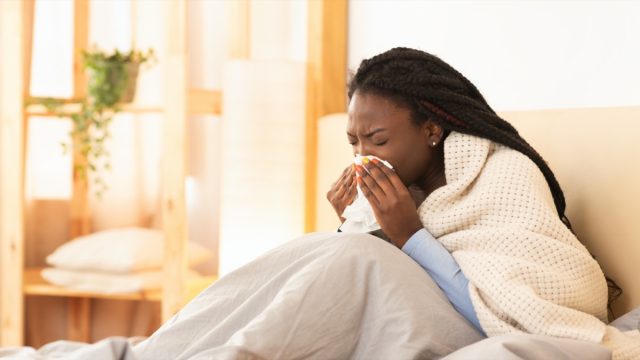
With COVID-19 still spreading throughout the U.S. and beyond, many people are paying closer attention to their health and well-being than ever before, from practicing diligent hand hygiene to wearing a mask out in public. However, in many cases, what’s inside your home could be making you sick, as well. In fact, one single item that you’re neglecting to clean regularly could be the culprit behind some serious health issues, coronavirus included: your HVAC filters.
Indoor air filters can harbor many types of harmful bacteria and fungi—pathogens that can be redistributed into your home environment if your filters aren’t cleaned frequently. Plus, an oft-cited COVID study released by the Centers for Disease Control and Prevention (CDC) found that one air-conditioned restaurant in Guangzhou, China spread COVID to three families via “strong airflow from the air conditioner.”
In another study, which has not yet undergone scientific review, researchers in Oregon collected samples from inside a hospital’s HVAC system and found genetic material from SARS-CoV-2, the virus that causes COVID-19. Their findings demonstrate that it may be possible for the virus to be transmitted through HVAC systems, especially those that are not regularly and thoroughly cleaned.
COVID aside, filthy HVAC filters are a serious health risk. In a 2014 study published in Mycobiology, researchers discovered nine fungal species on the high-efficiency particulate air (HEPA) filters studied, noting that many of these fungi were known to prompt allergenic responses. The Environmental Protection Agency (EPA) explains that indoor air pollution, such as that caused by the redistribution of allergens in a space, can cause headaches, fatigue, dizziness, and irritation of your nose, eyes, and throat, among other effects.
“When [HVAC systems] are poorly maintained or neglected, allergens get stuck and are stored inside the ducts for a long period of time,” explains Natalie Barrett, service quality supervisor at Nifty Duct Cleaning. “In fact, if you live in a building with other apartments, not cleaning your air ducts can harm your neighbors as well.”
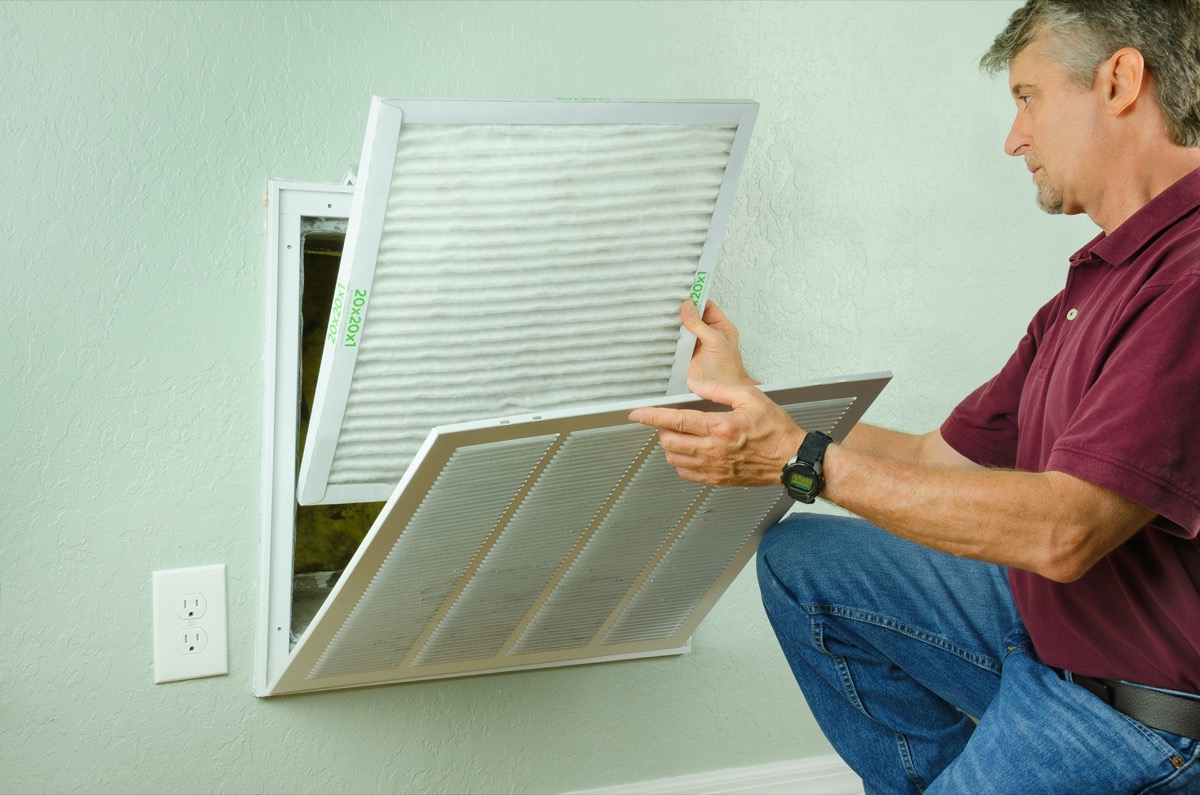
If you want to ensure you’re doing your best to keep yourself (and your neighbors) healthy, make sure you’re not only cleaning, but replacing your filters regularly.
“HVAC and furnace filters need to be changed at least every 90 days,” says Bailey Carson, head of cleaning for Handy. She recommends replacing your filters at the beginning of the winter and then again three months later.
That’s not the only potential contributor to your poor health inside your home, though. Read on to discover what other household items could be making you sick without proper cleaning. And if you want to get your home spotless, check out these Genius Tricks That Will Cut Your Cleaning Time in Half.
1
Dishwasher Seals
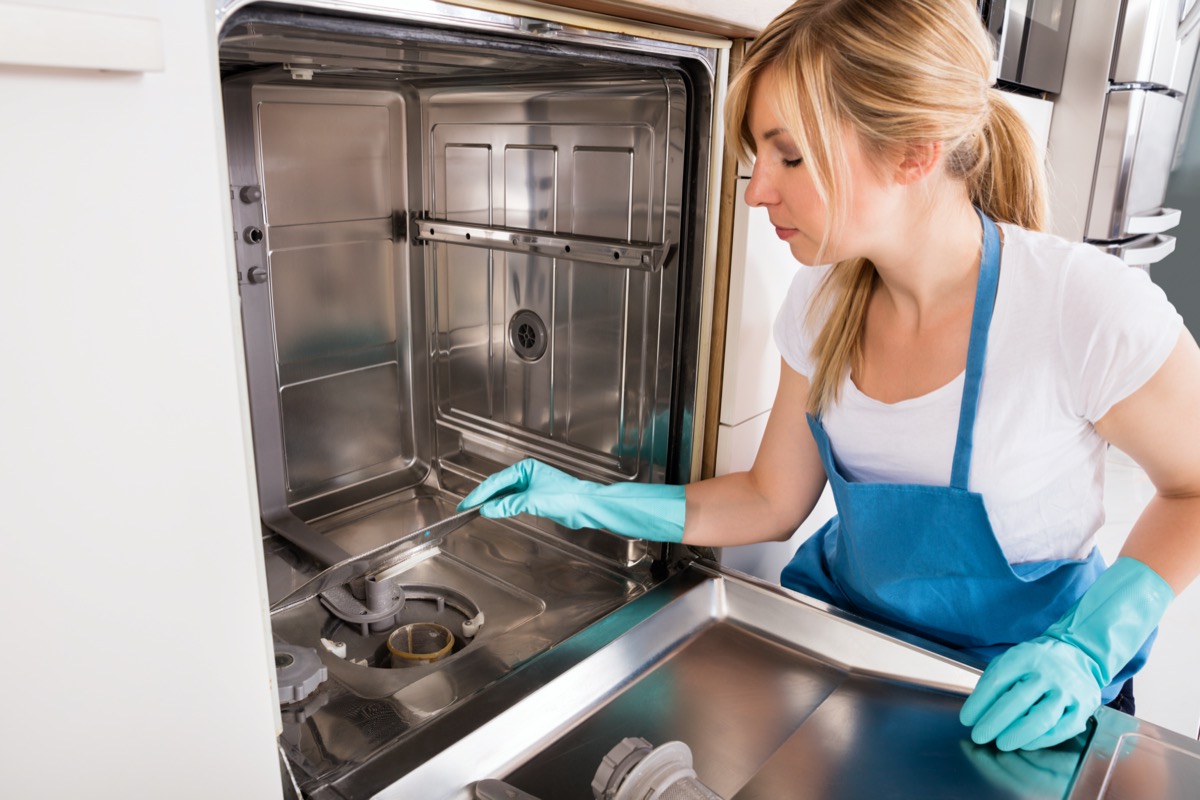
The rubber seal around your dishwasher could be harboring a shocking amount of bacteria—and potentially redistributing it onto your dishes. According to a 2019 study published in BMC Microbiology, among a sample of 30 dishwashers, 632 types of bacteria were discovered, including E. coli, a potential indicator of fecal contamination. As a result, the study’s researchers note that “dishwashers cannot be ignored as potential sources of human infections.”
However, if you want to get your dishwasher seal clean, a soap and water scrub followed by a spray of hydrogen peroxide can help. And for more great tips delivered to your inbox, sign up for our daily newsletter.
2
Kitchen Sponges
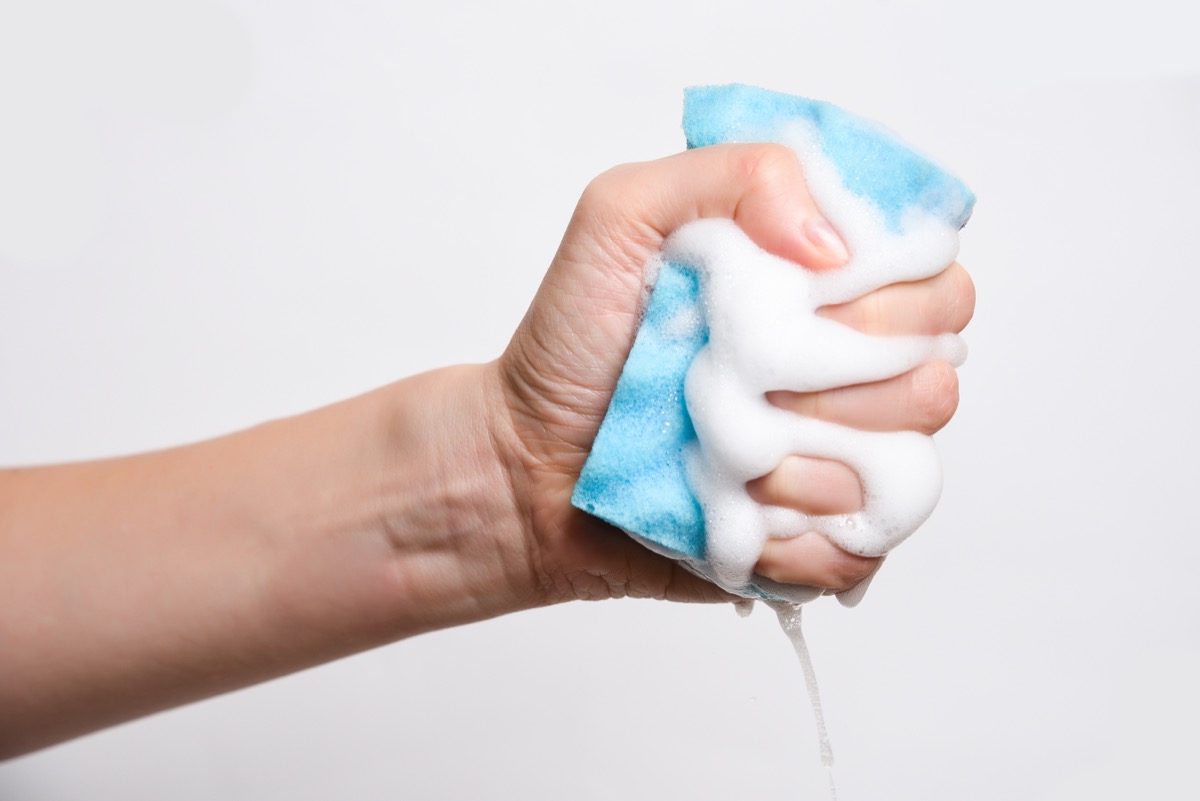
If you’re not disinfecting—or, better yet, replacing—your kitchen sponge frequently, you could be putting yourself at risk for illness. In a 2016 study published in the International Journal of Food Science, 201 sponges from food establishments were tested for contamination, with researchers discovering that 64.9 percent had significant amounts of coliform bacteria, a bacterial category that includes E. coli. Plus, 72.8 percent had detectable amounts of yeast and 45.7 percent had mold.
If you want to kill the pathogens on your sponge, the U.S. Department of Agriculture (USDA) recommends microwaving your sponge while damp (as long as it has no metal scrubbing components) or putting it through the dishwasher, cleaning methods that both kill over 99.9 percent of bacteria. And for more filthy objects inside your house, check out The Absolute Germiest Thing in Your Home, according to science.
3
Cutting Boards
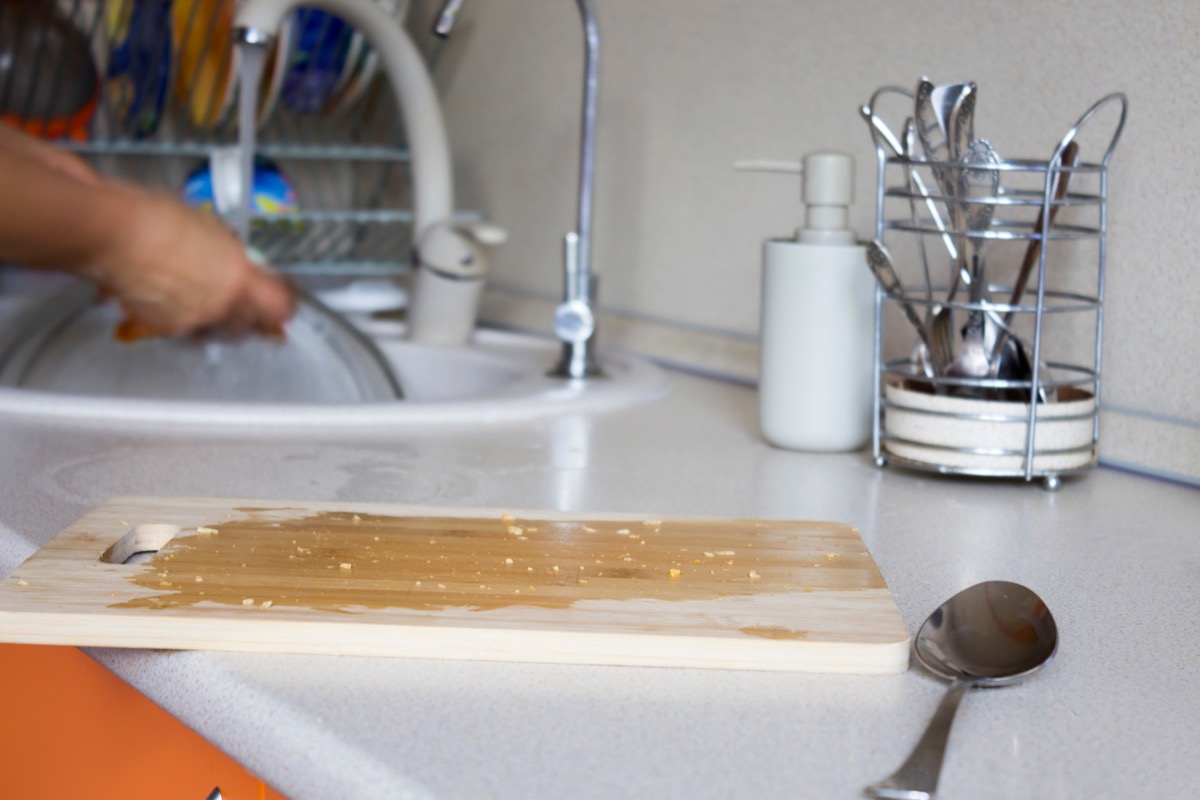
While you likely clean your cutting boards on a regular basis, if you’re not sanitizing them, you could be putting your health in jeopardy. A 2018 study published in Foodborne Pathogens and Disease reveals that, even after washing, many cutting boards harbored dangerous salmonella bacteria.
If you want to disinfect your cutting board, cleaning company Molly Maid recommends removing visible debris and wiping your board with either white vinegar or three percent hydrogen peroxide, then rinsing the board and allowing it to dry thoroughly afterward.
4
Mops
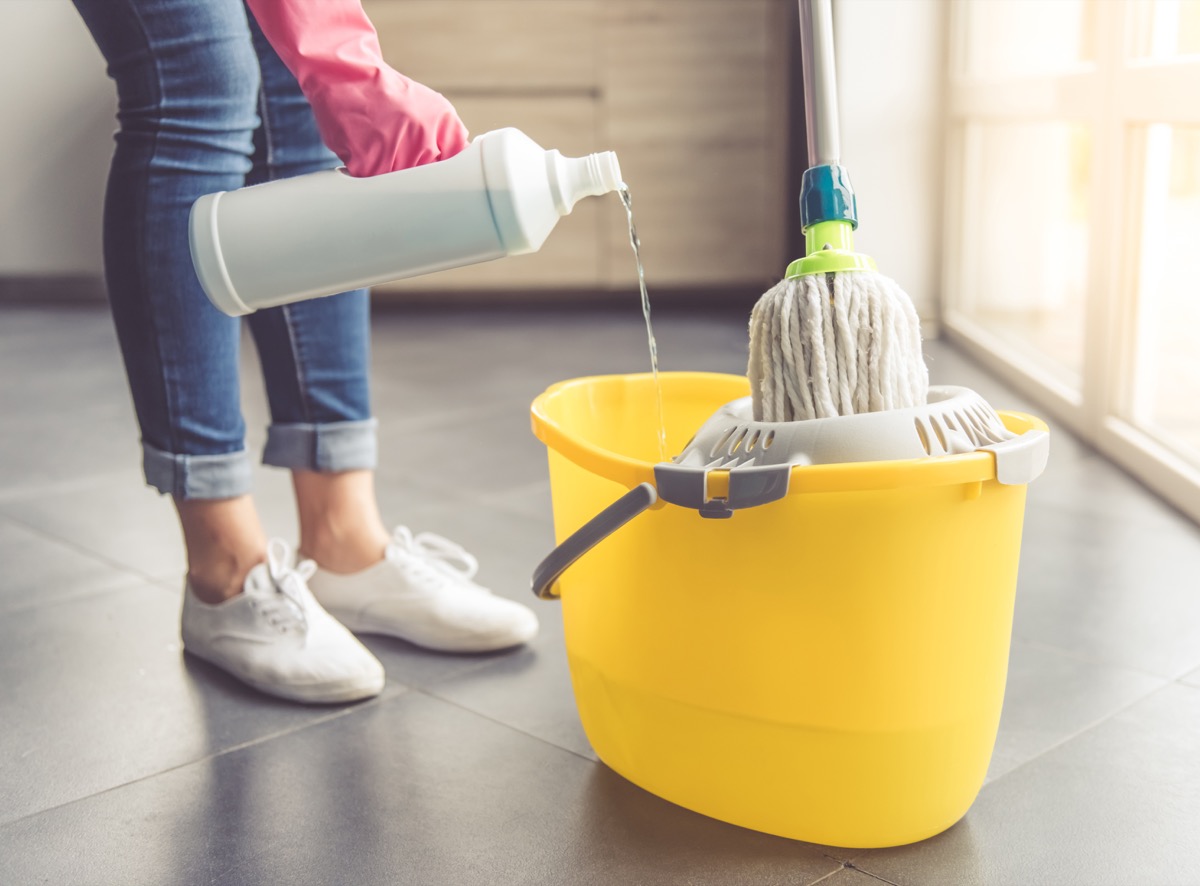
You use your mop to clean up around your house, but when’s the last time you actually cleaned the mop head itself? Unfortunately, if the answer is never, you could be significantly increasing the amount of bacteria in your home. According to a 2018 paper published in the Journal of Hospital & Medical Management, “the mopping procedure can actually spread heavy microbial contamination.”
However, there’s an easy fix: Simply toss that mop head in the wash on a hot cycle and dry it thoroughly or opt for single-use mopping pads instead. And for more ways to level up your cleaning routine, check out these Genius Products That Make Cleaning So Much Easier.